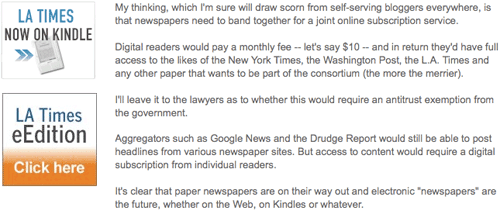Is 'internet news being free at the point of delivery' even still negotiable?
After Cale Cowan's withering response to the last time I joined in a trans-Atlantic debate about how newspapers can survive and thrive in a new media world, I suspect I may qualify as one of the "self-serving bloggers" mentioned in a David Lazarus piece in the LA Times last week.
David was making the suggestion that newspapers should group together and offer bundled-up electronic subscriptions. In another variation on the iTunes-for-news theme he argues that "iTunes proves newspapers can and should charge for online access".
"Digital readers would pay a monthly fee -- let's say $10 -- and in return they'd have full access to the likes of the New York Times, the Washington Post, the L.A. Times and any other paper that wants to be part of the consortium. I'll leave it to the lawyers as to whether this would require an antitrust exemption from the government. Aggregators such as Google News and the Drudge Report would still be able to post headlines from various newspaper sites. But access to content would require a digital subscription from individual readers. It's clear that paper newspapers are on their way out and electronic 'newspapers' are the future, whether on the Web, on Kindles or whatever."
The shift in thinking that David proposes is interesting. It would represent a change in the marketplace from trying to sell competing news sources, to trying to sell access to 'news as a genre'. To use the iTunes metaphor, he isn't proposing packaging up stories as songs, and titles as albums, he is proposing the equivalent of Apple offering a subscription to 'music'.
It isn't as if newspapers haven't ever tried selling news content online. As I read the article on my laptop in the UK, far away from where I could have ever seen his words in print or use a Kindle, there was an interesting juxtaposition between David's writing and the advertising of the existing paid-for LA Times digital models. A lot of papers have tried selling digital access on line, but so far only maybe the Wall Street Journal and the Financial Times have made any kind of success of it.

It is obvious that as an industry we are going to have make some big decisions and structural changes to address the fact that significant parts of our business model have been fundamentally changed. I'm just not convinced that 'internet news being free at the point of delivery' is still a negotiable part of the equation.
This is interesting and it could be worth an experiment - the question is, where or what is the added value....
Sure we can all spend time searching for what we want to read and we can find it for free - but do we all have time...
Check out what we are trying to do with creating a link archive at globalradionews.com
This is not going to be an easy issue to resolve. As Henry says, the question is, what value do the newspapers add - over and above free sources.
To an extent, that comes down to the difference made by good journalism and content, over and above a simple recitation of the bones of the story that can be found elsewhere. The FT wins on that score, because it is perceived to add real value. But it is also a work tool for financial professionals (rather like a lawyer's subscription to online sources of legal information) so it does not provide a reliable comparator for the supply of news services to ordinary consumers.
Part of the problem is of the newspapers' own making, because in their eagerness to attract eyeballs to the adverts they display they have conditioned the public to the idea that news is free. But there are other factors too. As long as there are big, reliable, news sources available for no charge (the BBC being perhaps the major force in this area, for UK internet users), it will always be very difficult for other news providers to differentiate themselves in a way that could persuade people to pay.
I suspect that the way to achieve the transition may be for quality newspapers to charge consumers for a bundle, which includes much of their news reporting, together with other sources of interesting or useful copyright information, including books and magazines.
I think the the future will show that selling of information will not be the right way. The newspapers should focus on ways to earn money sideways of their information services. Advertising is not the only answer. There will be networking projects between company's, institutions and media, that's my guess...